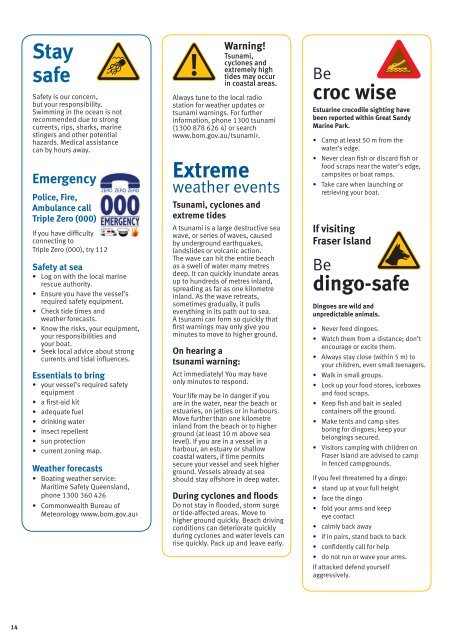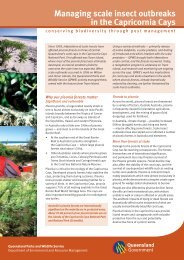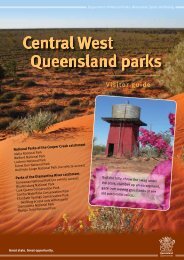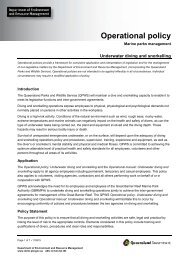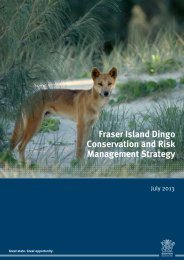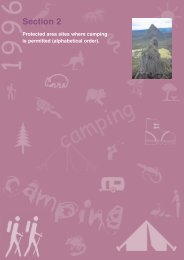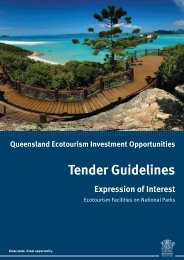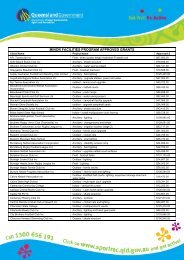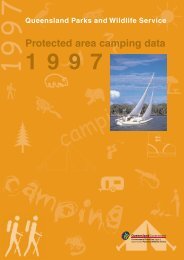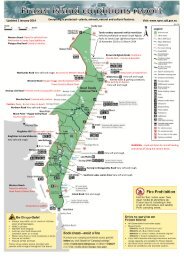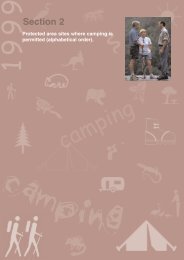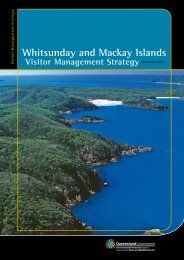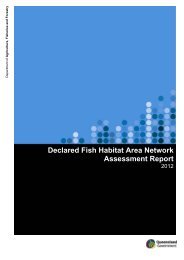Great Sandy Marine Park Visitor Guide - Department of National ...
Great Sandy Marine Park Visitor Guide - Department of National ...
Great Sandy Marine Park Visitor Guide - Department of National ...
You also want an ePaper? Increase the reach of your titles
YUMPU automatically turns print PDFs into web optimized ePapers that Google loves.
Stay<br />
safe<br />
Safety is our concern,<br />
but your responsibility.<br />
Swimming in the ocean is not<br />
recommended due to strong<br />
currents, rips, sharks, marine<br />
stingers and other potential<br />
hazards. Medical assistance<br />
can by hours away.<br />
Emergency<br />
Police, Fire,<br />
Ambulance call<br />
Triple Zero (000)<br />
If you have difficulty<br />
connecting to<br />
Triple Zero (000), try 112<br />
ZERO ZERO ZERO<br />
Safety at sea<br />
• Log on with the local marine<br />
rescue authority.<br />
• Ensure you have the vessel’s<br />
required safety equipment.<br />
• Check tide times and<br />
weather forecasts.<br />
• Know the risks, your equipment,<br />
your responsibilities and<br />
your boat.<br />
• Seek local advice about strong<br />
currents and tidal influences.<br />
Essentials to bring<br />
• your vessel’s required safety<br />
equipment<br />
• a first-aid kit<br />
• adequate fuel<br />
• drinking water<br />
• insect repellent<br />
• sun protection<br />
• current zoning map.<br />
Weather forecasts<br />
• Boating weather service:<br />
Maritime Safety Queensland,<br />
phone 1300 360 426<br />
• Commonwealth Bureau <strong>of</strong><br />
Meteorology <br />
Warning!<br />
Tsunami,<br />
cyclones and<br />
extremely high<br />
tides may occur<br />
in coastal areas.<br />
Always tune to the local radio<br />
station for weather updates or<br />
tsunami warnings. For further<br />
information, phone 1300 tsunami<br />
(1300 878 626 4) or search<br />
.<br />
Extreme<br />
weather events<br />
Tsunami, cyclones and<br />
extreme tides<br />
A tsunami is a large destructive sea<br />
wave, or series <strong>of</strong> waves, caused<br />
by underground earthquakes,<br />
landslides or volcanic action.<br />
The wave can hit the entire beach<br />
as a swell <strong>of</strong> water many metres<br />
deep. It can quickly inundate areas<br />
up to hundreds <strong>of</strong> metres inland,<br />
spreading as far as one kilometre<br />
inland. As the wave retreats,<br />
sometimes gradually, it pulls<br />
everything in its path out to sea.<br />
A tsunami can form so quickly that<br />
first warnings may only give you<br />
minutes to move to higher ground.<br />
On hearing a<br />
tsunami warning:<br />
Act immediately! You may have<br />
only minutes to respond.<br />
Your life may be in danger if you<br />
are in the water, near the beach or<br />
estuaries, on jetties or in harbours.<br />
Move further than one kilometre<br />
inland from the beach or to higher<br />
ground (at least 10 m above sea<br />
level). If you are in a vessel in a<br />
harbour, an estuary or shallow<br />
coastal waters, if time permits<br />
secure your vessel and seek higher<br />
ground. Vessels already at sea<br />
should stay <strong>of</strong>fshore in deep water.<br />
During cyclones and floods<br />
Do not stay in flooded, storm surge<br />
or tide-affected areas. Move to<br />
higher ground quickly. Beach driving<br />
conditions can deteriorate quickly<br />
during cyclones and water levels can<br />
rise quickly. Pack up and leave early.<br />
Be<br />
croc wise<br />
Estuarine crocodile sighting have<br />
been reported within <strong>Great</strong> <strong>Sandy</strong><br />
<strong>Marine</strong> <strong>Park</strong>.<br />
• Camp at least 50 m from the<br />
water’s edge.<br />
• Never clean fish or discard fish or<br />
food scraps near the water’s edge,<br />
campsites or boat ramps.<br />
• Take care when launching or<br />
retrieving your boat.<br />
If visiting<br />
Fraser Island<br />
Be<br />
dingo-safe<br />
Dingoes are wild and<br />
unpredictable animals.<br />
• Never feed dingoes.<br />
• Watch them from a distance; don’t<br />
encourage or excite them.<br />
• Always stay close (within 5 m) to<br />
your children, even small teenagers.<br />
• Walk in small groups.<br />
• Lock up your food stores, iceboxes<br />
and food scraps.<br />
• Keep fish and bait in sealed<br />
containers <strong>of</strong>f the ground.<br />
• Make tents and camp sites<br />
boring for dingoes; keep your<br />
belongings secured.<br />
• <strong>Visitor</strong>s camping with children on<br />
Fraser Island are advised to camp<br />
in fenced campgrounds.<br />
If you feel threatened by a dingo:<br />
• stand up at your full height<br />
• face the dingo<br />
• fold your arms and keep<br />
eye contact<br />
• calmly back away<br />
• if in pairs, stand back to back<br />
• confidently call for help<br />
• do not run or wave your arms.<br />
If attacked defend yourself<br />
aggressively.<br />
14


